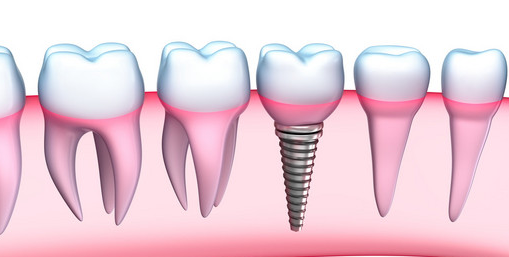There are several steps involved in the dental implant procedure. The entire process — from the surgical insertion of the implanted screw to the placement of the crown — can take several months. The timing of the steps in this process varies from person to person.

Here's what to expect:
On the day that your implant is placed you will receive local anesthesia to numb the area, and possibly intravenous (IV) sedation as well. Your dental surgeon will drill a hole into the jaw where the replacement tooth will be set. The titanium screw is inserted into this hole, and the gum tissue is stitched around or over a temporary cap placed over the implant. This is an outpatient procedure, so you will be able to go home the same day.
Over the course of several months, the bone around the implant will grow naturally and fuse with the implant to hold it in place. This process is known as osseointegration.
The dentist will take a mold for the crown.
Once the implant is secure, the dentist will replace the temporary cap with an abutment and attach the custom-made crown to the abutment.
Some people may not have enough natural bone left in their jaw to support an implant. This may be due to a number of reasons, including gum disease, genetics, and aging. In this case, a bone graft may be necessary to replace the lost bone before an implant can be inserted. A bone graft is a surgical procedure in which damaged or diseased bone is replaced with new bone. Bone grafts can be harvested from another bone in your body (your hip or chin, for example), from a human or animal donor, or made from synthetic bone produced in a lab.
In some cases, the implant and bone graft can be completed on the same day. This is known as one-stage implant placement. Candidates for one-stage implant placement must have very good bone density in the jawbone.
Caring for dental implants
Caring for an implant is the same as caring for the rest of your teeth and gums. That means brushing your teeth twice a day, flossing regularly, and visiting your dentist on a regular basis.
While dental implants are not prone to decay, the tissue that surrounds the implant is just as susceptible to periodontal disease as the gums around your natural teeth. Your dental team may recommend special brushes that will help clean around your implants, depending on the design of your crowns.